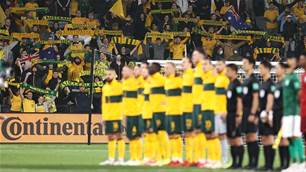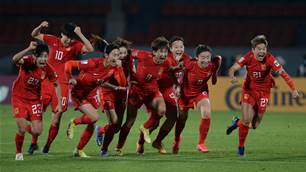Japan go into the 2010 World Cup with the weight of boss Takeshi Okada's declaration they are aiming for the last four on their shoulders.
While that may be beyond them, a place in the second round is more realistic after being drawn alongside Holland, Denmark and Cameroon in a Group E which should hold no fear for the East Asian side.
Following a relatively comfortable qualifying campaign, where they became the first team to book their place in South Africa, hopes are high Japan can emulate 2002 when they reached the second round.
Holland will in all likelihood win Group E but second place is very much up for grabs as neither Denmark nor Cameroon should hold much fear for the Japanese, particularly as the Danes were held to a goalless draw by neighbours South Korea.
However, they do go into the global showpiece with what can be considered a weaker squad compared to past editions and not in the greatest of form - a third-placed finish in the East Asian Football Federation Championships that they hosted was followed by a 3-0 friendly defeat to Serbia which has increased the pressure on Okada.
Much will depend on CSKA's Keisuke Honda, Wolfsburg's Makoto Hasebe and veteran midfielder Shunsuke Nakamura, who has returned to Japan with Yokohama Marinos, as well as Gamba Osaka midfielder Yasuhito Endo's ability to impose himself on games.
Nagoya defender Marcus Tulio Tanaka could also have a crucial role to play and Kawasaki Frontale playmaker Kengo Nakamura will be expected to provide some of the attacking threat but it is the lack of an out and out goalscorer that is a worry. As such, Okada could do worse than take a chance on young striker Takayuki Morimoto, currently playing in Serie A with Catania.
The 21-year-old is perhaps the antithesis of the typical Japanese forward, big and powerful but also with a good turn of pace and his goalscoring instinct could provide Japan with a vital edge come June.
If Japan do achieve Okada's goal of reaching the semi-finals, they would have comfortably surpassed their previous best at a World Cup, the second round appearance on home turf eight years ago.
Okada was in charge for their first World Cup finals appearance at France 98, where they lost all three group games although Masashi Nakayama had the distinction of scoring the country's first goal in the 2-1 defeat to Jamaica.
They fared much better four years later as co-hosts with South Korea, reaching the second round where they were defeated by eventual semi-finalists Turkey 1-0 having beaten Russia and then Tunisia in the group stage.
The Blue Samurai disappointingly failed to build on that success in Germany in 2006 as they relinquished a one-goal lead in the final nine minutes to go down 3-1 to Australia. A goalless draw with Croatia followed and their exit was confirmed with a 4-1 defeat to Brazil.
Japan also became the first country to qualify for the 2010 World Cup when Shinji Okazaki's ninth-minute header was good enough to see off Uzbekistan at Pakhtakor Stadium on June 6, 2009 and a 16-month journey through Asia's convoluted system reached a successful conclusion with two games to spare.
Entering at the the third round, Japan were drawn in Group Two alongside Bahrain, Oman and Thailand, sides not expected to pose too many problems for the East Asians. However, they began their campaign under a cloud after boss Ivica Osim suffered a stroke and had to be replaced by Okada.
"I didn't have time to make a whole plan for the qualifiers when I started working with the team," Okada said.
A comprehensive 4-0 victory over Thailand at Saitama Stadium on February 6, 2008 saw Japan get off to the perfect start but they suffered a surprise 1-0 reverse to Bahrain in Manama next time out, prolific striker Ala'a Hubail's looping header clinching the Gulf nation's first ever win against their illustrious opponents 12 minutes from time.
However, they got back on track with a 3-0 win over Oman and they trailed Bahrain by three points at the halfway stage.
Endo's second half penalty saw Okada's men salvage a 1-1 draw in the return fixture in Oman - who were under the guidance of caretaker coach Hamad Al Azzani - but it was as you were going into the final two games when Bahrain were surprisingly held 1-1 at home to Thailand, who Japan faced the following week in Bangkok.
"It will be a must win game for us,'" Okada said.
"But our team is moulding nicely after having been together a long time."
Japan brushed aside the south-east Asian nation 3-0 at the Rajamangala Stadium and with Bahrain again drawing at home - this time to Oman - it meant the final group game at Saitama Stadium between the two qualified nations was rendered academic.
Atsuto Uchida's bizarre last-minute winner - his header bounced over goalkeeper Sayed Mohamed Jafar - settled the contest in Japan's favour after Nakamura had earlier missed a penalty.
Japan were again drawn with Bahrain in the final round of qualifying along with Australia, Qatar and Uzbekistan in what was considered the easier of the two groups.
Okada said: "I have faith that we are quite capable of getting through this qualifying group. To meet Bahrain away in our first match, we have to make sure that we don't make the same mistake as in our previous visit."
And they did not as Nakamura, Endo and Kengo Nakamura's goals saw them fend off a late fightback by 10-man Bahrain to win 3-2 in Manama.
A 1-1 draw at home to Uzbekistan - who had lost their two opening games - followed. An impressive 3-0 win over Qatar - a team who had outclassed the Uzbeks by the same scoreline two months previously - in Doha in November 2008 saw the Japanese put distance between them and the rest as they tried to keep pace with leaders Australia.
The showdown with Australia in February 2009 at Yokohama ended in a tame goalless draw but Nakamura's deflected free-kick downed Bahrain at Saitama Stadium, meaning Japan could clinch their place in a fourth consecutive World Cup with a win in Uzbekistan.
And Okazaki's header booked their ticket to South Africa, although the hosts hit the bar twice in the final stages.
A 1-1 draw at home to Qatar and 2-1 defeat in Australia, only the second of their entire qualifying campaign, then brought down the curtain on a job well done.
Following a relatively comfortable qualifying campaign, where they became the first team to book their place in South Africa, hopes are high Japan can emulate 2002 when they reached the second round.
Holland will in all likelihood win Group E but second place is very much up for grabs as neither Denmark nor Cameroon should hold much fear for the Japanese, particularly as the Danes were held to a goalless draw by neighbours South Korea.
However, they do go into the global showpiece with what can be considered a weaker squad compared to past editions and not in the greatest of form - a third-placed finish in the East Asian Football Federation Championships that they hosted was followed by a 3-0 friendly defeat to Serbia which has increased the pressure on Okada.
Much will depend on CSKA's Keisuke Honda, Wolfsburg's Makoto Hasebe and veteran midfielder Shunsuke Nakamura, who has returned to Japan with Yokohama Marinos, as well as Gamba Osaka midfielder Yasuhito Endo's ability to impose himself on games.
Nagoya defender Marcus Tulio Tanaka could also have a crucial role to play and Kawasaki Frontale playmaker Kengo Nakamura will be expected to provide some of the attacking threat but it is the lack of an out and out goalscorer that is a worry. As such, Okada could do worse than take a chance on young striker Takayuki Morimoto, currently playing in Serie A with Catania.
The 21-year-old is perhaps the antithesis of the typical Japanese forward, big and powerful but also with a good turn of pace and his goalscoring instinct could provide Japan with a vital edge come June.
If Japan do achieve Okada's goal of reaching the semi-finals, they would have comfortably surpassed their previous best at a World Cup, the second round appearance on home turf eight years ago.
Okada was in charge for their first World Cup finals appearance at France 98, where they lost all three group games although Masashi Nakayama had the distinction of scoring the country's first goal in the 2-1 defeat to Jamaica.
They fared much better four years later as co-hosts with South Korea, reaching the second round where they were defeated by eventual semi-finalists Turkey 1-0 having beaten Russia and then Tunisia in the group stage.
The Blue Samurai disappointingly failed to build on that success in Germany in 2006 as they relinquished a one-goal lead in the final nine minutes to go down 3-1 to Australia. A goalless draw with Croatia followed and their exit was confirmed with a 4-1 defeat to Brazil.
Japan also became the first country to qualify for the 2010 World Cup when Shinji Okazaki's ninth-minute header was good enough to see off Uzbekistan at Pakhtakor Stadium on June 6, 2009 and a 16-month journey through Asia's convoluted system reached a successful conclusion with two games to spare.
Entering at the the third round, Japan were drawn in Group Two alongside Bahrain, Oman and Thailand, sides not expected to pose too many problems for the East Asians. However, they began their campaign under a cloud after boss Ivica Osim suffered a stroke and had to be replaced by Okada.
"I didn't have time to make a whole plan for the qualifiers when I started working with the team," Okada said.
A comprehensive 4-0 victory over Thailand at Saitama Stadium on February 6, 2008 saw Japan get off to the perfect start but they suffered a surprise 1-0 reverse to Bahrain in Manama next time out, prolific striker Ala'a Hubail's looping header clinching the Gulf nation's first ever win against their illustrious opponents 12 minutes from time.
However, they got back on track with a 3-0 win over Oman and they trailed Bahrain by three points at the halfway stage.
Endo's second half penalty saw Okada's men salvage a 1-1 draw in the return fixture in Oman - who were under the guidance of caretaker coach Hamad Al Azzani - but it was as you were going into the final two games when Bahrain were surprisingly held 1-1 at home to Thailand, who Japan faced the following week in Bangkok.
"It will be a must win game for us,'" Okada said.
"But our team is moulding nicely after having been together a long time."
Japan brushed aside the south-east Asian nation 3-0 at the Rajamangala Stadium and with Bahrain again drawing at home - this time to Oman - it meant the final group game at Saitama Stadium between the two qualified nations was rendered academic.
Atsuto Uchida's bizarre last-minute winner - his header bounced over goalkeeper Sayed Mohamed Jafar - settled the contest in Japan's favour after Nakamura had earlier missed a penalty.
Japan were again drawn with Bahrain in the final round of qualifying along with Australia, Qatar and Uzbekistan in what was considered the easier of the two groups.
Okada said: "I have faith that we are quite capable of getting through this qualifying group. To meet Bahrain away in our first match, we have to make sure that we don't make the same mistake as in our previous visit."
And they did not as Nakamura, Endo and Kengo Nakamura's goals saw them fend off a late fightback by 10-man Bahrain to win 3-2 in Manama.
A 1-1 draw at home to Uzbekistan - who had lost their two opening games - followed. An impressive 3-0 win over Qatar - a team who had outclassed the Uzbeks by the same scoreline two months previously - in Doha in November 2008 saw the Japanese put distance between them and the rest as they tried to keep pace with leaders Australia.
The showdown with Australia in February 2009 at Yokohama ended in a tame goalless draw but Nakamura's deflected free-kick downed Bahrain at Saitama Stadium, meaning Japan could clinch their place in a fourth consecutive World Cup with a win in Uzbekistan.
And Okazaki's header booked their ticket to South Africa, although the hosts hit the bar twice in the final stages.
A 1-1 draw at home to Qatar and 2-1 defeat in Australia, only the second of their entire qualifying campaign, then brought down the curtain on a job well done.
Copyright (c) Press Association
Related Articles

Socceroos bid to avoid World Cup calamity

Muscat sounds Socceroos warning as Samurai Blue bid to deliver brutal blow













